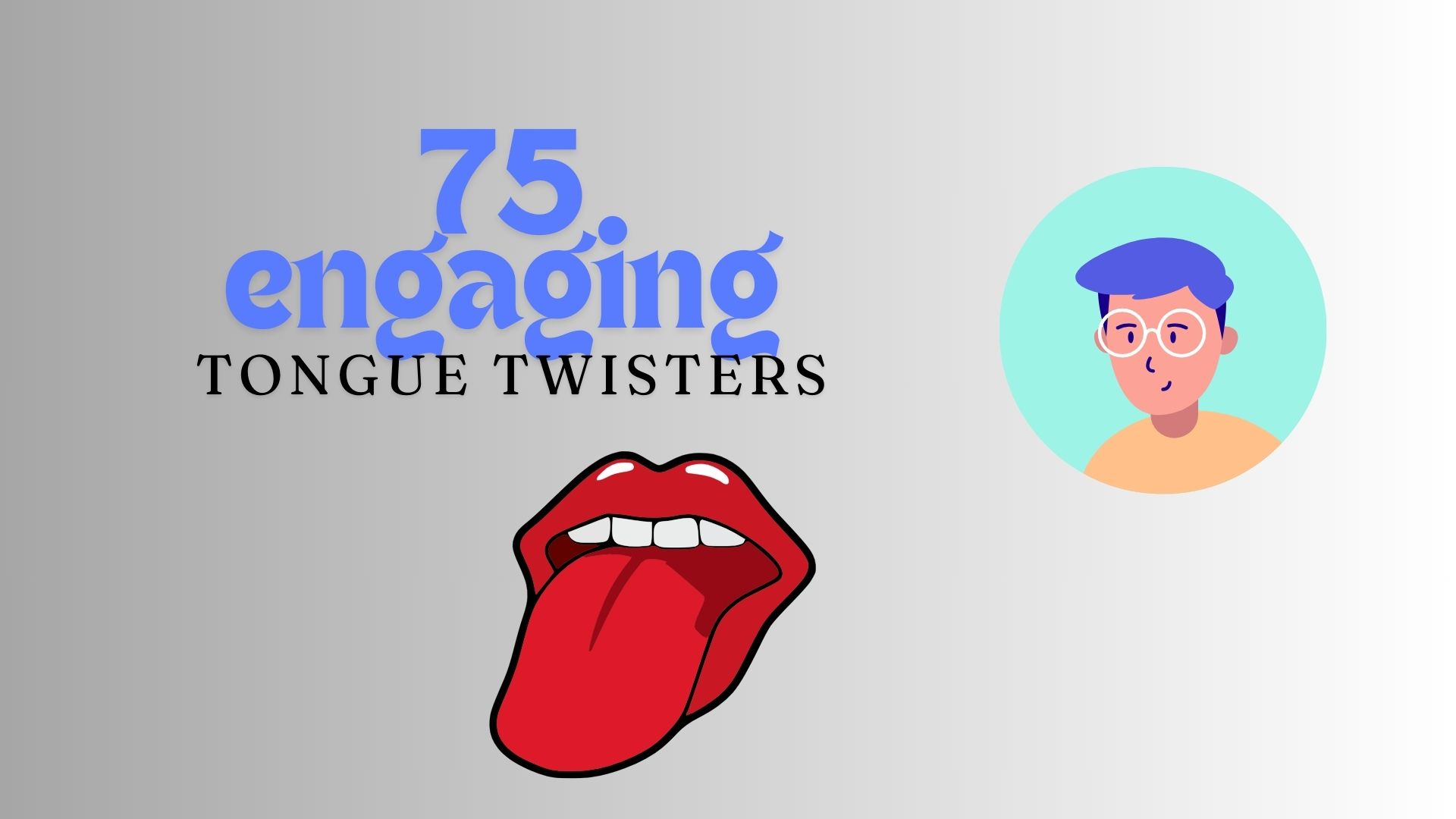Tongue twisters are fun, challenging word games. Originally made by poets and linguists, they’ve moved beyond just being fun. Now, they’re also tools in speech therapy and education. They use tricks like alliteration, rhyme, and quick sound changes.
These help speakers work on speaking clearly and coordinating their voices well. Even though they might sound silly, tongue twisters are really useful. They help people learn to speak clearly, whether they’re just learning a language or improving after a speech problem. Everyone finds something valuable and enjoyable in mastering them.
Tongue Twisters for Practicing Pronunciation
Tongue twisters are fun and great for improving your speaking. They help you say words more clearly and learn to tell the difference between sounds that are alike.
75 engaging tongue twisters

Practising pronunciation can be fun and tough at the same time. Tongue twisters are a great way to sharpen your speaking skills and have some fun. They’re like little games for your mouth and brain. Let’s look at four tongue twisters that are perfect for adults wanting to improve how they speak:
| Tongue Twister | IPA Transcription |
|---|---|
| She sells sea shells by the seashore. | /ʃi sɛlz si ʃɛlz baɪ ðə ˈsiˌʃɔr/ |
| Peter Piper picked a peck of pickled peppers. | /ˈpiːtər ˈpaɪpər pɪkt ə pɛk əv ˈpɪkəld ˈpɛpərz/ |
| How can a clam cram in a clean cream can? | /haʊ kæn ə klæm kræm ɪn ə klin krim kæn/ |
| I scream, you scream, we all scream for ice cream. | /aɪ skrim, ju skrim, wi ɔl skrim fɔr aɪs krim/ |
| Betty Botter bought some butter, but she said the butter’s bitter. | /ˈbɛti ˈbɑtər bɔt səm ˈbʌtər, bʌt ʃi sɛd ðə ˈbʌtərz ˈbɪtər/ |
| Can you can a can as a canner can can a can? | /kæn ju kæn ə kæn æz ə ˈkænər kæn kæn ə kæn/ |
| Six sleek swans swam swiftly southwards. | /sɪks slik swɑnz swæm ˈswɪftli ˈsaʊθwərdz/ |
| Fuzzy Wuzzy was a bear, Fuzzy Wuzzy had no hair. | /ˈfʌzi ˈwʌzi wəz ə bɛr, ˈfʌzi ˈwʌzi hæd noʊ hɛr/ |
| You know New York, you need New York, you know you need unique New York. | /ju noʊ nu jɔrk, ju nid nu jɔrk, ju noʊ ju nid juˈnik nu jɔrk/ |
| I saw Susie sitting in a shoeshine shop. | /aɪ sɔ ˈsuzi ˈsɪtɪŋ ɪn ə ˈʃuˌʃaɪn ʃɑp/ |
| How many boards could the Mongols hoard if the Mongol hordes got bored? | /haʊ ˈmɛni bɔrdz kʊd ðə ˈmɑŋgəlz hɔrd ɪf ðə ˈmɑŋgəl hɔrdz gɑt bɔrd?/ |
| The thirty-three thieves thought that they thrilled the throne throughout Thursday. | /ðə ˈθɜrtiˈθri θivz θɔt ðæt ðeɪ θrɪld ðə θroʊn θruˈaʊt ˈθɜrzdeɪ/ |
| Something in a thirty-acre thermal thicket of thorns and thistles thumped and thundered. | /ˈsʌmθɪŋ ɪn ə ˈθɜrti-ˈeɪkər ˈθɜrməl ˈθɪkɪt əv θɔrnz ənd ˈθɪsəlz θʌmpt ənd ˈθʌndərd/ |
| Can you imagine an imaginary menagerie manager imagining managing an imaginary menagerie? | /kæn ju ɪˈmæʤɪn ən ɪˈmæʤɪˌnɛri məˈnæʤəri ˈmænəʤər ɪˈmæʤɪnɪŋ ˈmænɪʤɪŋ ən ɪˈmæʤɪˌnɛri məˈnæʤəri?/ |
| The sixth sick sheik’s sixth sheep’s sick. | /ðə sɪksθ sɪk ʃiks sɪksθ ʃips sɪk/ |
| A big black bug bit a big black dog on his big black nose. | /ə bɪg blæk bʌg bɪt ə bɪg blæk dɔg ɑn hɪz bɪg blæk noʊz/ |
| Eleven benevolent elephants. | /ɪˈlɛvən bəˈnɛvələnt ˈɛlɪfənts/ |
| Two tried and true tridents. | /tu traɪd ənd tru ˈtraɪdənts/ |
| Rolling red wagons. | /ˈroʊlɪŋ rɛd ˈwægənz/ |
| Black back bat. | /blæk bæk bæt/ |
| Six sticky skeletons. | /sɪks ˈstɪki ˈskɛlɪtənz/ |
| Which witch is which? | /wɪʧ wɪʧ ɪz wɪʧ/ |
| Snap crackle pop. | /snæp ˈkrækəl pɑp/ |
| Six sleek swans swam swiftly southwards. | /sɪks slik swɑnz swæm ˈswɪftli ˈsaʊθwərdz/ |
| Giddy gophers grab grand green grapes. | /ˈgɪdi ˈgoʊfərz græb grænd grin greɪps/ |
| Freshly fried fresh flesh. | /ˈfrɛʃli fraɪd frɛʃ flɛʃ/ |
| Real rear wheel. | /ril rɪr wil/ |
| Good blood, bad blood. | /gʊd blʌd, bæd blʌd/ |
| Pre-shrunk silk shirts. | /pri-ʃrʌŋk sɪlk ʃɜrts/ |
| Flash message. | /flæʃ ˈmɛsɪʤ/ |
| Red lorry, yellow lorry. | /rɛd ˈlɔri, ˈjɛloʊ ˈlɔri/ |
| Thin sticks, thick bricks. | /θɪn stɪks, θɪk brɪks/ |
| Stupid superstition. | /ˈstupɪd ˌsupərˈstɪʃən/ |
| Eleven yellow yoyos. | /ɪˈlɛvən ˈjɛloʊ ˈjoʊˌjoʊz/ |
| Two tiny tigers take two taxis to town. | /tu ˈtaɪni ˈtaɪgərz teɪk tu ˈtæksiz tə taʊn/ |
| Six sharp smart sharks. | /sɪks ʃɑrp smɑrt ʃɑrks/ |
| Lesser leather never weathered wetter weather better. | /ˈlɛsər ˈlɛðər ˈnɛvər ˈwɛðərd ˈwɛtər ˈwɛðər ˈbɛtər/ |
| A box of mixed biscuits, a mixed biscuit box. | /ə bɑks əv mɪkst ˈbɪskɪts, ə mɪkst ˈbɪskɪt bɑks/ |
| Picky people pick Peter Pan Peanut Butter. | /ˈpɪki ˈpipəl pɪk ˈpitər pæn ˈpinət ˈbʌtər/ |
| Seventy-seven benevolent elephants. | /ˈsɛvənˌtiˈsɛvən bəˈnɛvələnt ˈɛlɪfənts/ |
| The cat catchers can’t catch caught cats. | /ðə kæt ˈkæʧərz kænt kæʧ kɔt kæts/ |
| Blue bluebird. | /blu ˈbluˌbɜrd/ |
| Red Buick, blue Buick. | /rɛd ˈbjuɪk, blu ˈbjuɪk/ |
| Green glass globes glow greenly. | /grin glæs gloʊbz gloʊ ˈgrinli/ |
| Knapsack straps. | /ˈnæpˌsæk stræps/ |
| Five frantic frogs fled from fifty fierce fishes. | /faɪv ˈfræntɪk frɔgz flɛd frəm ˈfɪfti fɪrs ˈfɪʃɪz/ |
| Nine nice night nurses nursing nicely. | /naɪn naɪs naɪt ˈnɜrsɪz ˈnɜrsɪŋ ˈnaɪsli/ |
| Four furious friends fought for the phone. | /fɔr ˈfjʊriəs frɛndz fɔt fɔr ðə foʊn/ |
| Pretty Kitty Creighton had a cotton batten cat. | /ˈprɪti ˈkɪti ˈkreɪtən hæd ə ˈkɑtən ˈbætən kæt/ |
| The big bug bit the little beetle. | /ðə bɪg bʌg bɪt ðə ˈlɪtəl ˈbitəl/ |
| A dozen double damask dinner napkins. | /ə ˈdʌzən ˈdʌbəl ˈdæməsk ˈdɪnər ˈnæpkɪnz/ |
| Fred fed Ted bread, and Ted fed Fred bread. | /frɛd fɛd tɛd brɛd, ənd tɛd fɛd frɛd brɛd/ |
| I slit a sheet, a sheet I slit, upon a slitted sheet I sit. | /aɪ slɪt ə ʃit, ə ʃit aɪ slɪt, əˈpɑn ə ˈslɪtɪd ʃit aɪ sɪt/ |
| A skunk sat on a stump and thunk the stump stunk. | /ə skʌŋk sæt ɑn ə stʌmp ənd θʌŋk ðə stʌmp stʌŋk/ |
| The boot black brought the black boot back. | /ðə but blæk brɔt ðə blæk but bæk/ |
| She sees cheese. | /ʃi siz ʧiz/ |
| The blue bluebird blinks. | /ðə blu ˈbluˌbɜrd blɪŋks/ |
| For fine fresh fish for you, cook’s cook cool calf meat. | /fɔr faɪn frɛʃ fɪʃ fɔr ju, kʊks kʊk kul kæf mit/ |
| Clean clams crammed in clean cans. | /klin klæmz kræmd ɪn klin kænz/ |
| Six slimy snails sailed silently. | /sɪks ˈslaɪmi sneɪlz seɪld ˈsaɪləntli/ |
| Selfish shellfish. | /ˈsɛlfɪʃ ˈʃɛlˌfɪʃ/ |
| Seven slick slimy snakes slowly sliding southward. | /ˈsɛvən slɪk ˈslaɪmi sneɪks ˈsloʊli ˈslaɪdɪŋ ˈsaʊθwərd/ |
| Gobbling gargoyles gobbled gobbling goblins. | /ˈgɑblɪŋ ˈgɑrgɔɪlz ˈgɑbəld ˈgɑblɪŋ ˈgɑblɪnz/ |
| Fred’s friends fried Fritos for Friday’s food. | /frɛdz frɛndz fraɪd ˈfritoz fɔr ˈfraɪdeɪz fud/ |
| A twister of twists once twisted a twist. | /ə ˈtwɪstər əv twɪsts wʌns ˈtwɪstɪd ə twɪst/ |
| Double bubble gum, bubbles double. | /ˈdʌbəl ˈbʌbəl gʌm, ˈbʌbəlz ˈdʌbəl/ |
| The great Greek grape growers grow great Greek grapes. | /ðə greɪt grik greɪp ˈgroʊərz groʊ greɪt grik greɪps/ |
| Singing Sammy sung songs on sinking sand. | /ˈsɪŋɪŋ ˈsæmi sʌŋ sɔŋz ɑn ˈsɪŋkɪŋ sænd/ |
| Rhys watched Ross switch his Irish wristwatch for a Swiss wristwatch. | /ris wɑʧt rɔs swɪʧ hɪz ˈaɪrɪʃ ˈrɪstwɑʧ fɔr ə swɪs ˈrɪstwɑʧ/ |
| I wish to wash my Irish wristwatch. | /aɪ wɪʃ tə wɑʃ maɪ ˈaɪrɪʃ ˈrɪstwɑʧ/ |
| Near an ear, a nearer ear, a nearly eerie ear. | /nɪr ən ɪr, ə ˈnɪrər ɪr, ə ˈnɪrli ˈɪri ɪr/ |
| Eddie edited it. | /ˈɛdi ˈɛdɪtɪd ɪt/ |
| A big black bear sat on a big black rug. | /ə bɪg blæk bɛr sæt ɑn ə bɪg blæk rʌg/ |
| Tommy threw Tim three thumbtacks. | /ˈtɑmi θru tɪm θri ˈθʌmtæks/ |
Benefits of Practicing Tongue Twisters for Adults
Tongue twisters are great for adults. They help you speak more clearly. When you practice them, you get better at saying words right. This means people understand you better.
Improved pronunciation
Improving pronunciation isn’t just about sounding better; it’s crucial for clear communication. One fun and effective way to enhance how you speak is by using tongue twisters regularly. Let’s break down why they’re so helpful:
- Sound Clarity: Tongue twisters make you practice tricky sounds. This reduces mistakes in everyday speech.
- Muscle Coordination: Using these phrases often strengthens the muscles in your mouth and tongue. This is important for speaking clearly.
- Memory Skills: Tongue twisters can also boost your memory for words.
- Confidence in Speaking: Getting good at these challenging phrases can make you feel more confident in your speaking abilities.
Enhanced fluency
Tongue twisters are a fun way for adults to improve their speaking clearly and quickly. When you practice these tricky phrases often, you train yourself to speak without tripping over words. This can be a big help if you need to talk clearly in jobs where good communication matters.
Plus, tongue twisters are not just good practice; they’re fun. Their rhythm makes saying them enjoyable. If you keep at it, you’ll likely see your speech improve, and you’ll feel more confident when you talk to others.
Improved accents
Using tongue twisters regularly can really sharpen your accent. It improves how you pronounce words and makes your speech clearer.
Here’s what you’ll gain from sticking with it:
- Better Sound Recognition: Tongue twisters help you notice small differences in sounds, which is super important when you’re learning a new accent.
- Stronger Speech Muscles: When you practice tough phrases over and over, your mouth gets a good workout. This helps you pronounce words more easily and naturally.
- More Awareness of How You Talk: As you work on tongue twisters, you start to notice your own speech patterns. This is crucial for fixing and enhancing the way you speak.
- More Confidence: The better you get, the more confident you feel. This makes you want to speak up more in the new accent you’re learning.
Conclusion
Tongue twisters are more than fun word games. They actually help you improve your pronouncing and speaking skills. Think of them as a workout for your language skills. They’re not only for kids or just for laughs; even adults and professionals use them to improve their speech. By practising these tricky phrases, you can make your speech clearer and more fluent. They come in all levels of difficulty, so everyone from beginners to advanced speakers can find a suitable challenge.

